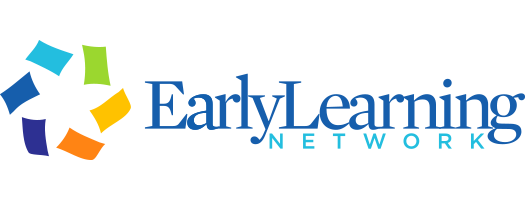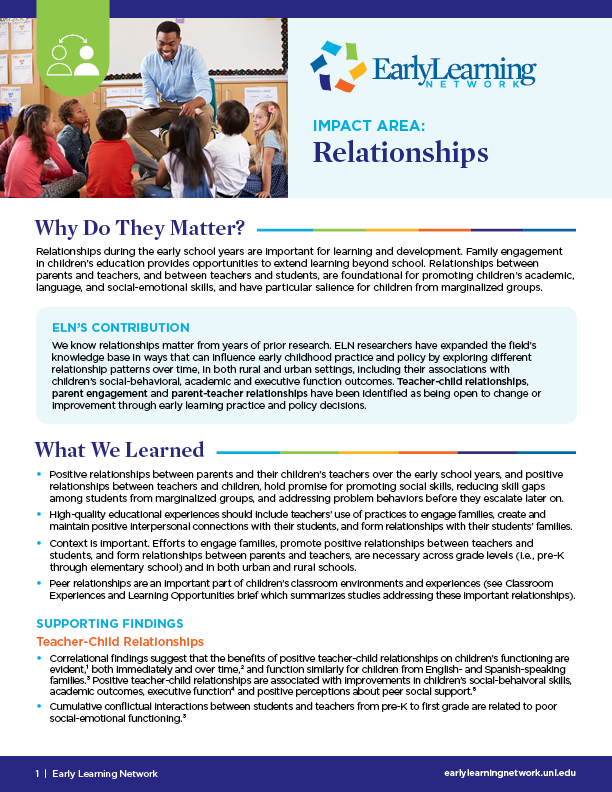
31 Aug Impact Area: Relationships
Early Learning Network research strengthens the field’s understanding of how positive relationships support high-quality educational experiences for young children.
Early Learning Network (ELN) teams recently released a set of briefs focused on four impact areas — factors open to change or improvement — that have potential to narrow opportunity gaps and help children maintain early learning success as they transition from prekindergarten (pre-K) to elementary school and beyond.
The primary goal of these briefs is to inform practice and policy decisions that support equitable and effective learning opportunities for children.
This blog highlights the network’s collective research associated with the impact area of Relationships, including a key takeaway; action steps for practice, policy and research; and insights from the field.
Research Highlights
Relationships
Why do relationships matter?
We know from years of prior research that relationships during the early school years are important for learning and development. Active family engagement in children’s education provides opportunities to extend learning outside the classroom. These relationships, be they between parents and teachers or teachers and students, are foundational for promoting children’s academic, language, and social-emotional skills, and are particularly impactful for children from marginalized groups.
What has the network contributed to the field in this area?
ELN research has expanded the field’s knowledge base in ways that can influence early childhood practice and policy by exploring different relationship patterns over time, spanning both rural and urban settings, including their associations with children’s social-behavioral, academic and executive function outcomes. Importantly, teacher-child relationships, parent engagement and parent-teacher relationships are open to change and improvement through strategic early learning practice and policy decisions.
What’s the network’s key takeaway regarding relationships?
After analyzing the network’s collective research findings on relationships, and integrating feedback from geographically diverse practitioners, policymakers, and state and federal partners, a key takeaway emerged:
High-quality educational experiences should include educators’ use of practices to engage and form relationships with families; create and maintain positive interpersonal connections with students and promote and support positive peer relationships.
Action Steps
To implement this key takeaway, the following action steps are suggested:
For Practice:
- Provide pre-service and in-service educators, administrators and support staff with high-quality professional learning opportunities, including customized training and coaching, to: Engage and form relationships with families; create and maintain positive interpersonal connections with students; and promote and support positive peer relationships.
For Policy:
- Build and modify current structures/systems (e.g., time, resources) to support educators’ skills at forming, strengthening and maintaining effective and meaningful relationships with and among students and families across the pre-K to third grade continuum.
For Research:
- Identify existing and new research-based practices and approaches for building and maintaining quality relationships with and among students and families that can be applied across contexts (e.g., rural/urban, pre-K, early elementary).
Insights from the Field
Daniel Nowak, elementary school teacher for Omaha Public Schools in Nebraska, served as a panelist during the ELN Forum and contributed to the development of these action steps.
In this next section, Nowak offers insights on the network’s findings related to relationships and the impact they have on children’s early learning success.
Practice-Focused Insights
The Early Learning Network’s findings on relationships reinforce a lot of what Nowak and his colleagues currently believe and practice with students and their families.
“It is helpful whenever you have research to back up what you’re thinking or doing as a teacher,” Nowak said. “To build positive relationships, I think it’s important for us to be engaging in as many opportunities with families as possible and to establish a rapport, even before students walk in the door.”
While Nowak has used many strategies to connect with students and families over his 20 years in education, he finds written communication is especially meaningful. Each year in August, he sends personalized postcards to students before the school year starts.
“When students get something in the mail, it makes them excited about the year,” Nowak said. “I will introduce myself and say, ‘Hey, I found out you’re going to be in my class this year and I can’t wait to meet you!’ It doesn’t take very much time and can go a long way.”
According to Nowak, it is crucial to maintain regular contact with families, outside of parent-teacher conferences. For example, his school has had success hosting family nights that promote math and reading.
“Family nights have been very effective, because they give teachers and families an opportunity to engage with each other, but not in a formal way, while empowering parents to support their child’s skills at home,” Nowak said.
To build effective, meaningful relationships, it’s important for teachers to give students and families a chance to see them as real people, Nowak underscored.
“It’s great for students to see their principal sit in the dunk tank or have a teacher who goes to a skating party and isn’t afraid to look silly and fall down,” Nowak said, “These are opportunities for students to see teachers as people, not just teachers, and for families to see teachers as people who are not perfect. They really want what’s best for their child.”
Teachers can also strengthen relationships with parents by reaching out with a phone call to share positive things their child is doing at school — not just to share bad news.
“A positive phone call can be powerful,” Nowak said. “When you’re mixing in the positive phone calls with the negative phone calls, it makes those negative calls with parents less difficult — and it’s often easier to reach them.”
Policy-Focused Insights
Nowak recommended that schools/programs offer mentoring and coaching opportunities to support new teachers’ skills at developing relationships with students and families
“In our district, first-year teachers are paired with a mentor teacher,” Nowak said. “If you get paired with a great mentor teacher, that person kind of takes you under his or her wing and extends that student teaching experience. If it’s a good fit, both teachers can learn things from each other.”
Nowak has also seen how bringing pre-K students into the school environment can foster relationships, both among students and between students and teachers, which supports a smooth pre-K to kindergarten transition.
“A lot depends on how a school system is structured, but our school is very good about incorporating pre-K into the rest of the school and including them in events during the year,” Nowak said. “Pre-K students are taught in a portable outside the main building, but they are constantly coming into the building and have opportunities to go to library and computer lab. They also partner with a ‘buddy room’ to read books and play games with older students. I think the pre-K students feel like they’re part of the school by the end of the year — and they can see what it will look like when they’re big kids going into kindergarten.”
Nowak recommended that schools prioritize time and resources on strengthening relationships between teachers, students and their families, given the influence they have on student success — perhaps now more than ever.
“There are a lot of different things forcing schools to play a more significant role in children’s development now than probably 20 or 30 years ago, whether they’re dealing with incarceration, not able to pay for food or the family is breaking up because one or both of the parents are being deported,” Nowak said. “Lots of families are struggling and can greatly benefit from home-school connections.”
The next blog will explore another impact area that emerged from the network’s research: Sustained High-Quality Experiences.



